
of the cardiac muscle of the ventricles in the heart, making them quiver rather than contract properly.
Ventricular fibrillation is the most commonly identified arrhythmia in cardiac arrest patients. While
there is some activity, a pulse rate is undetectable by feeling for for a pulse on any major arteries.
Ventricular fibrillation is a medical emergency that requires prompt Advanced Life Support interventions.
If this arrhythmia continues for more than a few seconds, it will likely degenerate further into asystole.
This condition results in cardiogenic shock and cessation of effective blood circulation. As a consequence,
sudden cardiac death (SCD) will result in a matter of minutes, especially if they deteriorate into Asystole
When distinguishing the difference between V Fib and V Tach,
V Fib is an irregular rhythm, and V Tach is a regular rhythm

http://en.wikipedia.org/wiki/ventricular tachacardia
